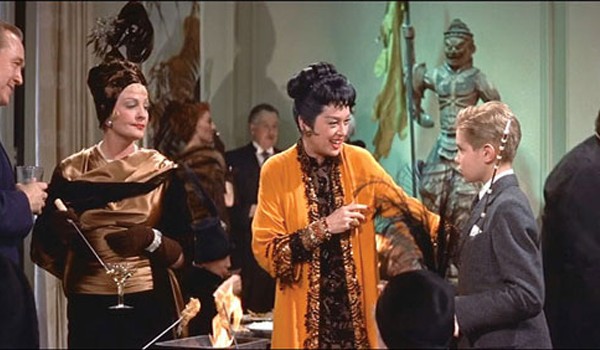One of the main ways the Canon is passed along, in the absence of serious critical attention, is from mother to daughter. You grow up with certain movies as something your mom watches all the time, and by the time you yourself are an adult, you’ve either come to see the thing’s actual merits or else just watch it for a connection to your mother. Or both; it can as always be two things.
So it is with me and Auntie Mame, which my mother loves. Rosalind Russell stars as the irrepressible Mame Dennis. In 1928, her estranged brother dies; as she is her nephew’s only relative, she becomes his guardian. However, her brother thought she was a loon and also established a trustee, Dwight Babcock (Fred Clark), who works for a bank so conservative “they don’t even pay dividends!” After an incident wherein young Patrick (Jan Handzlik) is discovered at the school Mame chose for him, which is nudist, Babcock sends Patrick to boarding school and only allows him near Mame on the holidays. In 1929, Mame loses her money in the crash, and she works a series of jobs, poorly, before meeting Beauregard Jackson Pickett Burnside (Forrest Tucker), a wealthy oilman.
Mame and Beau marry and travel the world. Although she stays in touch with Patrick, “Uncle Dwight” turns him as conventional as possible. After Beau dies falling off the Matterhorn, Mame returns to New York to play the distraught widow. So Patrick arranges for her to write her memoirs, installing a secretary, Agnes Gooch (Peggy Cass), and a cowriter, Brian O’Bannion (Robin Hughes), in her apartment. Meanwhile, he himself has fallen for Gloria Upson (Joanna Barnes), a really top-drawer socialite whose parents are friends of Uncle Dwight’s. It is only this last that shakes Mame out of her depression.
I’ve never seen the musical, but a book I have suggests that the problem with the Lucille Ball version is that she wants everyone to love her, whereas Rosalind Russell as Mame loves everyone. She does take a certain joy in playing Loving Mother to Patrick, but she is also genuinely distraught when he is dragged away to boarding school. She has a stereotypical houseboy, Ito (Yuki Shimoda), and Irish housekeeper, Norah Muldoon (Connie Gilchrist), but she treats them as people. In fact, Norah arrives with Patrick and just stays on, drawn into Mame’s orbit like everyone else.
Naturally, this sets up the grand conflict of the story, between Mame and the Forces of Conformity. Mame has no problem being whoever you want to be, even if that’s exactly like someone else. She’s even tolerant of the grandstanding of her best friend, Vera Charles (Coral Browne), even though Vera’s from Pittsburgh and not High Society as she claims. Hell, Mame herself is from Buffalo. The problem is that Babcock and the Upsons expect everyone to be exactly like everyone else. The Upson home, Upson Downs, is in a Restricted area, and they are appalled that they might get a Jewish cellist as a neighbour instead of a good little WASP like Patrick after he marries their Gloria.
I mean, the timeline here makes absolutely no sense, but even in 1958, there were still plenty of people who thought that way. Yes, okay, the Supreme Court abolished racially restrictive covenants in 1948, and the home for refugee children Mame establishes makes more since immediately post-war, but still. Patrick goes to Mame’s home in October 1928; within weeks, it is October 1929 and the stock market has crashed. The movie allegedly ends in 1946, meaning the whole story takes place over eighteen years. In that space, Patrick goes from being a ten-year-old boy to having a ten-year-old boy. It makes considerably more sense to assume that’s an error and go with the ending as being in 1956, even though that’s a year after the book came out.
Look, you don’t watch this movie for the logic of it. You watch it for Rosalind Russell at her sparkling best. And she does range from floating through social ecstasies to genuinely grief-stricken when Patrick is taken from her. It’s a great performance; even just keeping a straight face in some of the scenes would require a great performance, and Mame fits my definition of an ideal comedy character—she does not know she is funny. Or, rather, she knows she is funny when she’s deliberately being funny, but when she’s having wild scrapes, it’s all for real for her.
Edward Everett Tanner III wrote the book under the name Patrick Dennis. He had initially claimed that the basis for the story was his actual aunt, Marion Tanner, but after they had a falling out—in part because she went with that claim—he began to deny it. Indeed, the parallels are far from exact, but the elder Tanner, who died at the age of 96, well after her nephew did, seems to have been her own sort of charming lady. Not charming in the stylish way of Mame Dennis, necessarily, but one of the problems he had with her was that she would routinely use the money she sent him taking care of the derelicts of Greenwich Village in a large brownstone instead of supporting a quiet lifestyle for herself in a small apartment. Which is awfully Mame of her.
Help replace my poor, battered copy of the book; consider supporting my Patreon or Ko-fi!

